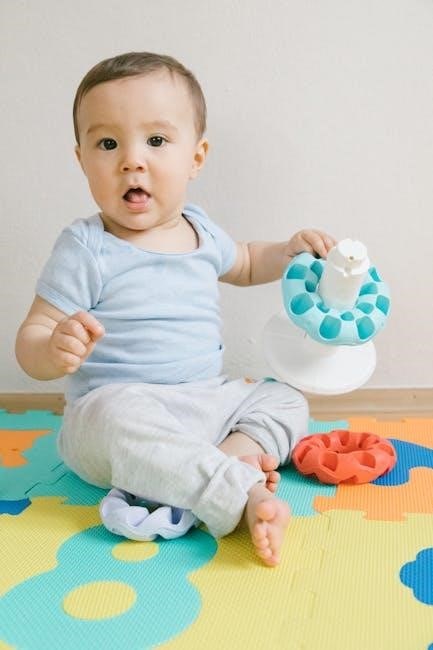Physical development in 3-5 year olds involves refining gross and fine motor skills through play. Activities like running, jumping, and using hands promote coordination, balance, and creativity.
Importance of Physical Development in Early Childhood
Physical development in early childhood is vital for enhancing motor skills, coordination, and balance. It fosters cognitive growth, social interaction, and emotional well-being. Engaging in activities like running, jumping, and using hands promotes independence and confidence. It also supports health by encouraging a lifelong active lifestyle and reducing the risk of chronic diseases. Furthermore, physical play aids in emotional expression and stress management, contributing to overall holistic development.
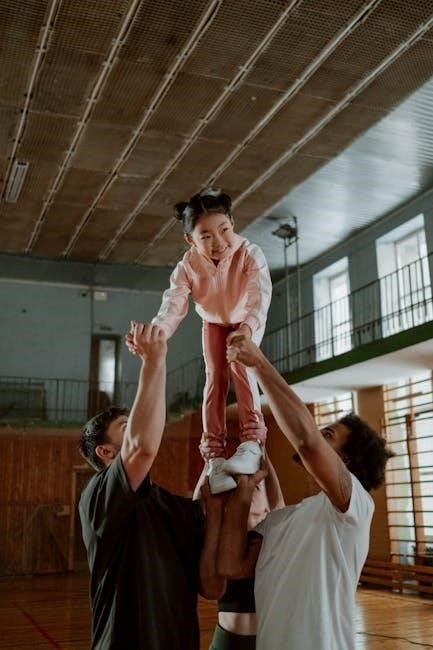
Gross Motor Skills Development Activities
Gross motor skills development activities enhance coordination, balance, and strength through running, jumping, ball games, obstacle courses, and group play, fostering physical confidence and overall well-being.
Running and Jumping Games
Running and jumping games are essential for developing coordination and endurance. Activities like tag, relay races, and hopscotch encourage active play, while jumping challenges, such as leaping over small obstacles, build strength and balance. These games not only improve physical fitness but also foster social interaction and imaginative play, making them ideal for young children to explore their movement capabilities in a fun, engaging environment.
Ball Games: Throwing, Catching, and Kicking
Ball games are fundamental for refining gross motor skills. Activities like tossing, catching, and kicking promote hand-eye coordination and dexterity. Simple games such as rolling a ball back and forth or kicking a ball through cones encourage active participation. These exercises not only enhance physical abilities but also teach teamwork and turn-taking, making them a valuable addition to any early childhood physical development program.
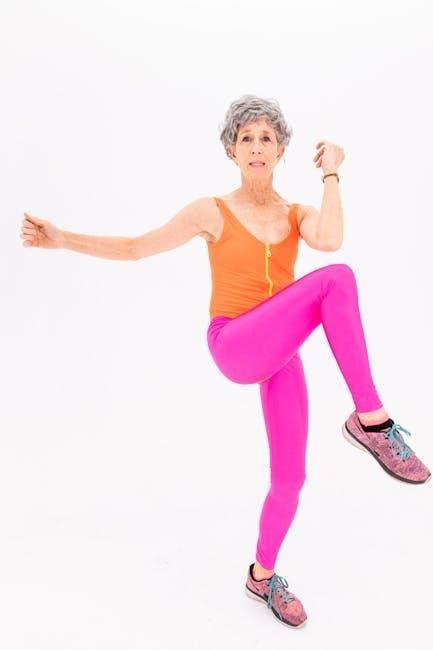
Fine Motor Skills Enhancement
Fine motor skills involve precise movements like using tweezers, marbles, or playdough, enhancing dexterity and hand-eye coordination through engaging, hands-on activities tailored for young children.
Finger Activities: Playdough, Tweezers, and Marbles
Finger activities like playdough shaping, using tweezers, and marble manipulation enhance fine motor skills in 3-5 year olds. Playdough strengthens hand muscles and encourages creativity, while tweezers improve pincer grip precision. Marble games develop dexterity and coordination, preparing children for tasks like writing and tying shoes. These activities are simple, engaging, and effective for refining small muscle control and hand-eye coordination in young children.
Mark Making and Pattern Tracing
Mark making and pattern tracing are essential for developing fine motor skills in 3-5 year olds. Using crayons or chalk, children practice drawing shapes and lines, improving hand control. Tracing patterns on paper or large surfaces enhances coordination and precision, laying the foundation for writing. These activities also foster creativity and problem-solving, encouraging children to explore and express their ideas through art and structured patterns.
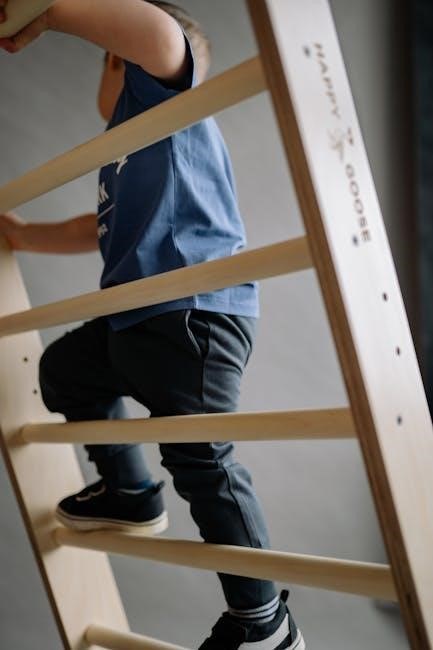
Structured vs. Unstructured Physical Activities
Structured activities, like obstacle courses, are planned and supervised, focusing on specific skills. Unstructured play, such as outdoor exploration, allows children to discover and play freely, fostering creativity.
Planned Activities: Obstacle Courses and Group Games
Obstacle courses and group games are excellent structured activities for 3-5 year olds. These activities enhance gross motor skills, such as running, jumping, and balancing, while promoting teamwork and social interaction. Obstacle courses can include crawling, climbing, and hopping, encouraging coordination and endurance. Group games, like tag or relay races, foster collaboration and physical fitness, making them ideal for supervised environments that support developmental growth in young children.
Unstructured Play: Exploring Outdoor Environments
Unstructured outdoor play allows children to freely explore and engage with their surroundings, fostering physical and cognitive development. Activities like running, climbing, and chasing encourage gross motor skills, while navigating natural environments enhances coordination and balance. Outdoor exploration promotes creativity, problem-solving, and a sense of adventure, making it a vital component of holistic development for 3-5 year olds.
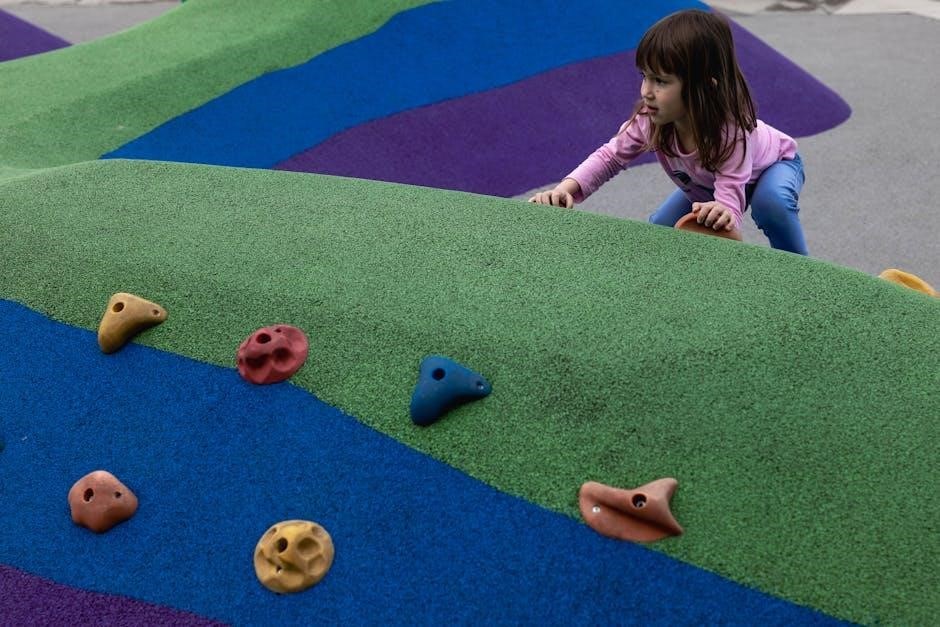
Age-Specific Physical Development Milestones
Children aged 3-5 years progress from basic balance and hopping to more complex movements like throwing, catching, and kicking, refining their gross motor skills effectively.
Activities for 3-Year-Olds: Crawling and Balancing
At three years old, children benefit from activities that enhance balance and coordination, such as crawling through tunnels or balancing on pillows. These exercises strengthen core muscles and improve gross motor skills. Simple obstacle courses with soft cushions or small hurdles encourage exploration and physical confidence. Supervised play ensures safety while fostering independence and coordination, laying the foundation for more complex movements in later years.
Activities for 4-5 Year Olds: Hopping and Complex Movements
Children aged 4-5 can engage in advanced activities like hopping on one foot, jumping over obstacles, and performing simple dance routines. These exercises improve balance, coordination, and overall physical fitness. Games involving kicking balls, throwing beanbags, and following movement patterns challenge their gross motor skills. Structured play helps refine these abilities, preparing them for more intricate movements as they grow and develop physically.
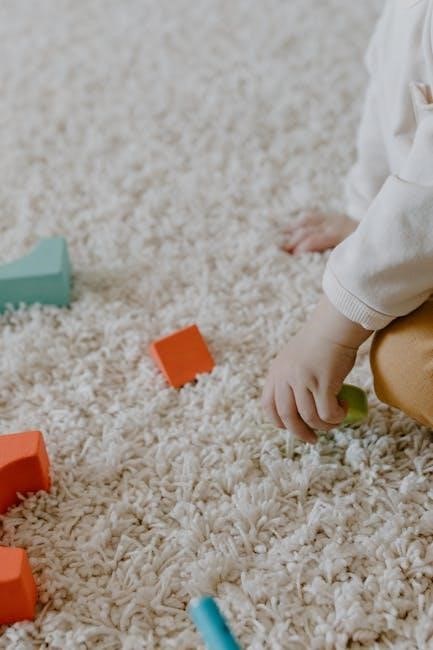
Safety and Supervision in Physical Activities
Ensuring a safe play environment is crucial. Remove hazards, provide soft surfaces, and ensure proper equipment. Adult supervision and guidance help prevent accidents and promote confidence in children.
Creating a Safe Play Environment
Creating a safe play environment involves checking for hazards, ensuring proper equipment, and supervising children. Soft surfaces, sturdy furniture, and age-appropriate toys are essential. Regularly inspect play areas and remove any potential risks. Adults should ensure children understand safety rules and demonstrate proper techniques. A safe environment fosters confidence and allows children to explore and develop physical skills without fear of injury.
Adult supervision is crucial for ensuring safety and providing guidance during physical activities. Adults should demonstrate techniques, offer encouragement, and adapt activities to suit each child’s abilities. By actively participating and giving constructive feedback, adults help children build confidence and improve their skills. Consistent guidance fosters a supportive environment where children can explore, learn, and develop at their own pace.
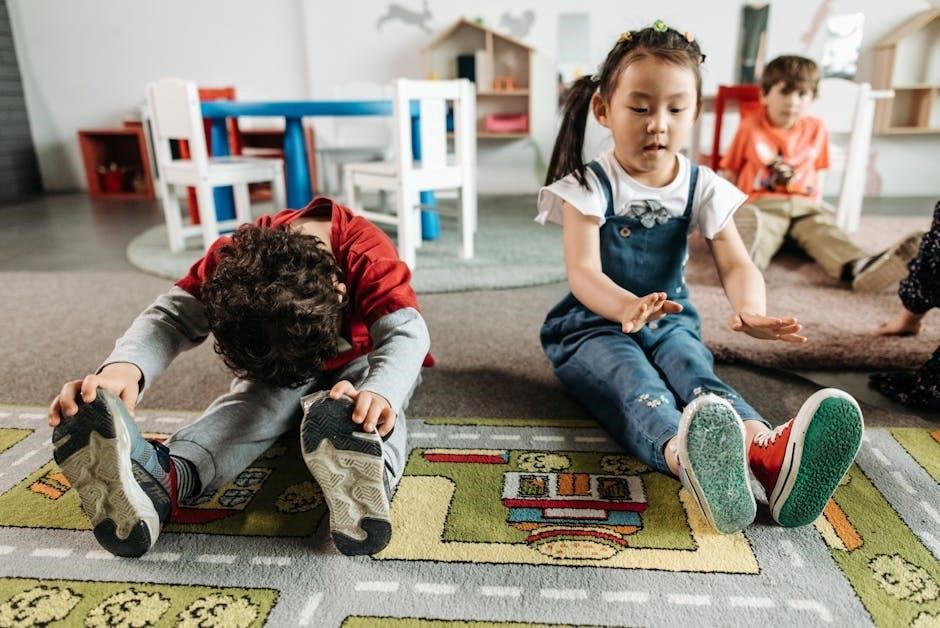
Outdoor Physical Activities
Adult Supervision and Guidance
Adult supervision ensures safety by creating a secure environment and adapting activities for each child’s needs. Providing clear instructions and demonstrating movements help children understand and master skills. Positive reinforcement and constructive feedback encourage effort and improvement. Adults should be actively involved, offering support while fostering independence. This guidance helps build confidence, enhances learning, and promotes physical development effectively in young children.
Water-Based Activities: Swimming and Splashing Games
Water-based activities, such as swimming and splashing games, are excellent for enhancing physical development in 3-5 year olds. Swimming improves coordination, balance, and stamina, while splashing games promote playful movement and teamwork. These activities also introduce water safety skills, building confidence and familiarity in aquatic environments. Structured sessions, like parent-and-baby swimming, are recommended, ensuring fun and developmental benefits in a safe and supervised setting.
Large Space Games: Tag, Relay Races, and Team Play
Large space games like tag, relay races, and team play are ideal for 3-5 year olds, fostering gross motor skills, speed, and agility. Tag encourages quick movements, while relay races teach coordination and teamwork. These activities enhance endurance and social interaction, helping children develop essential physical and collaborative abilities in a fun, engaging environment, while promoting active play and healthy lifestyles from an early age.
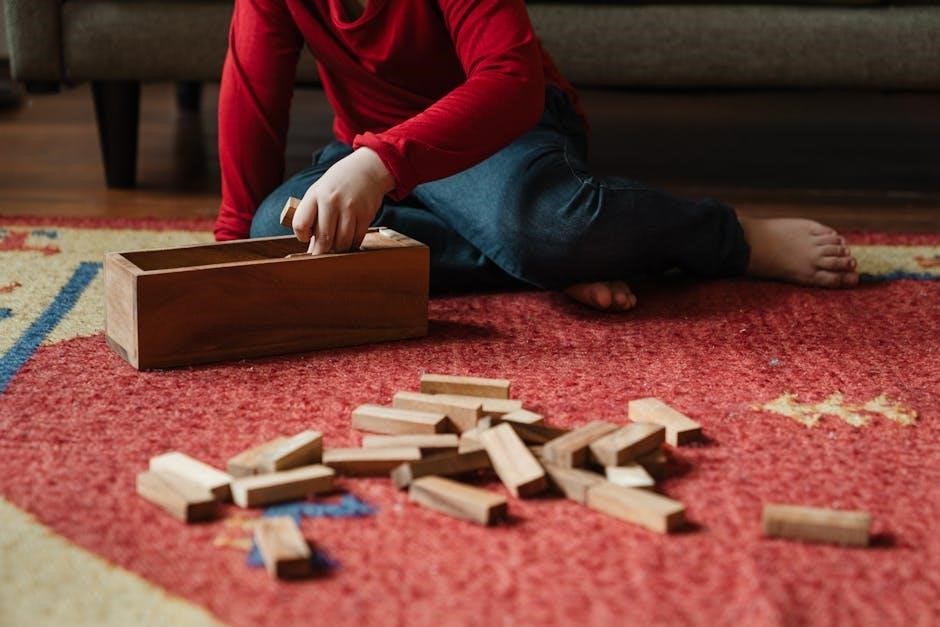
Monitoring Progress and Developmental Red Flags
Track children’s physical milestones and watch for delays in walking, balancing, or hand use. Consult professionals if concerns arise about movement or coordination skills.
Identifying Developmental Delays in Physical Skills
Signs of delays include difficulty with balance, coordination, or using hands. Look for red flags like inability to stand by 12 months or lack of interest in movement. Compare progress to typical milestones. If a child struggles with hopping by age 4 or shows limited fine motor skills, consult a professional. Early identification allows for timely intervention to support development effectively.
Adjusting Activities Based on Individual Needs
Activities should be tailored to each child’s abilities and interests. Use activity cards or skill cards to plan tasks that match developmental levels. Incorporate tools like tweezers or playdough for fine motor practice. Encourage children to set simple goals, fostering motivation. Adults can adapt games to suit individual needs, ensuring safety and engagement. Varied and structured play helps every child progress at their own pace while building confidence and physical skills effectively.

Resources and Planning for Physical Development
Use activity cards and skill cards to guide planning. Incorporate tools like playdough and tweezers for fine motor skills. Plan weekly schedules with structured and unstructured play.
Activity Cards and Skill Cards for Parents and Caregivers
Activity and skill cards provide parents and caregivers with practical, easy-to-follow guides for promoting physical development. These tools offer specific exercises like playdough molding and ball tossing. They are designed to be adaptable to various settings, ensuring children engage in activities that enhance both gross and fine motor skills. Regular use of these cards fosters consistency and progress in physical development, making them invaluable resources for caregivers.
Weekly Planning and Scheduling of Physical Activities
Weekly planning ensures consistent physical development in young children. Structured schedules incorporate diverse activities, such as obstacle courses and water play, tailored to age-specific needs. Parents and caregivers can rotate activities to maintain engagement and cater to different skill levels. Regular planning not only promotes physical growth but also helps in tracking progress and maintaining a balanced routine for holistic development.
